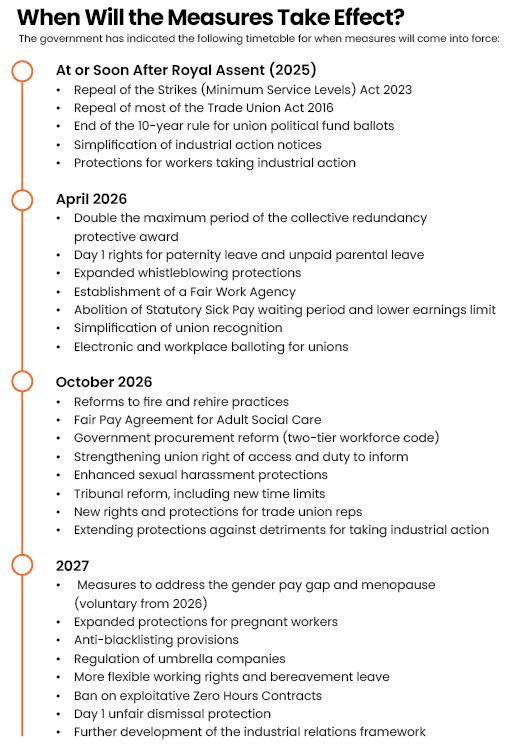Labours Employment Rights Act - Update
- msmithorganiser
- Jul 31, 2025
- 3 min read
In a post on the eve of the 2024 General Election we reviewed the promises Labour was setting out in its manifesto on new employment rights for individuals and for union building. We suggested unions remember the positive and negative lessons of the 1997 election and the 1999 Employment Rights Act. Here: Union Builders Better Get Ready
A year on and we are finally coming towards the end of the ping pong between the House of Commons and the House of Lords which has amended and changed the Bill. The Government has produced a graphic of its intended timetable for the contents of the new Employment Rights Act. (Below) As in 1997 to 1999 our focus as union builders has to be on whether this act makes it easier or harder for working people to form their unions without fear of reprisals by their employer. New individual rights at work are always welcome but tend to help lawyers more than they help us build sustainable workplace power.
The graphic below and posted at the end of July 2025 on social media, is helpful for assisting unions to re-organise themselves in good time to better take advantage of some new opportunities to bargain collectively and build our unions rather than beg in the courts as individuals
It also helps union builders move past this polarised period of cheerleading from Labour about "the biggest step for workers rights in a generation" on the one hand and doom and gloom "Labour betrayal" stories from the IER and others on the other side. The General Election is over. Critical support or objections to parts of ERA 2025 is no longer a Labour Party loyalty test. We need to focus on practical details
Union Builders have to focus on what new collective tools this Act might give us over the next two years and how sharp they are. The devil as always will be in the details. OfaC believes at least 8 urgent questions still need answering before anyone pops the Babycham:
1. What is the scope of the Fair Work Agency in relation to enforcing new rights in relation to the broken and retrospective ET system?
2. How is CAC union recognition to be simplified and how will this make it easier or harder for employers to intimidate workers into voting against their union?
3. How will fire and rehire/replace plans be stopped before they happen and how will this be enforced at work?
4. Will the Fair Pay Agreement in social care be just another Pay Review Body designed to undermine collective bargaining and how will the sector get the extra funding it needs to pay better wages prior to the care sector funding review in 2028?
5. How will the two tier workforce code work when we have up to three and four tiers of working conditions in many schools, hospitals, refuse and cleansing services and care homes? Will it be retrospectively applied and if so how?
6. How will workers access to unions at work be "strengthened" when it is effectively non existent at this point? How will union builders enforce this?
7. Will the measures to address gender pay gaps still require lengthy and expensive legal actions by unions and will they be extended to BAME, disability and LGTB pay discrimination?
8. How will zero and tiny hours employment contracts be banned and how will this work collectively? What will the govt definition of "exploitative" be and how will they protect workers from the same
co-ercion workers faced from employers in 1998 to opt out of the 48 hour working week laws?

Overall a big question will be about legally future proofing all these reforms, whether collective or individual, from any incoming Government


Comments